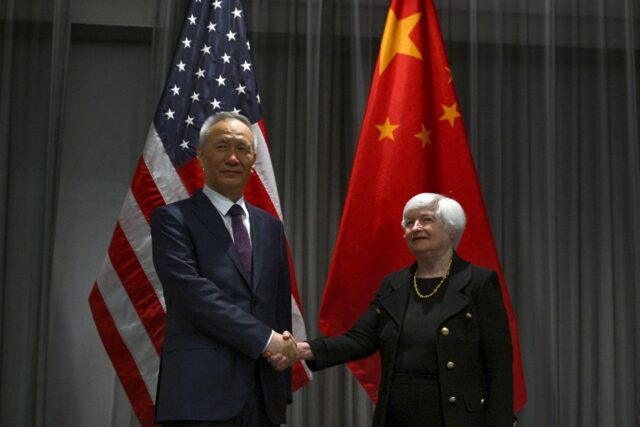US Treasury Secretary Janet Yellen will travel to China soon, following “constructive” discussions with her Chinese counterpart Wednesday, Washington said, as the two countries seek to boost ties and reduce tensions.
The first face-to-face meeting between Yellen and Chinese Vice Premier Liu He, held in Zurich, was “candid, substantive and constructive”, the US treasury department said in a statement.
“Both sides agreed it is important for the functioning of the global economy to further enhance communication around macroeconomic and financial issues,” and also agreed to “enhance cooperation on climate finance,” it added.
Following the “frank exchange of views,” it said that Yellen “looks forward to travelling to China and to welcoming her counterparts to the United States in the near future.”
The Chinese side also hailed the meeting, with state news agency Xinhua describing the talks as “constructive”, and the exchanges between Liu and Yellen as “in-depth, candid and practical.”
Liu, it reported, had said Yellen was welcome to visit his country “at an appropriate time this year”.
That announcement came just a day after it was confirmed that US Secretary of State Antony Blinken would make a long-awaited trip to Beijing on February 5-6.
He will be the first US secretary of state to travel to China since a brief visit in October 2018 by his Republican predecessor Mike Pompeo, known for his blistering criticism of Beijing.
The planned visits will occur amid heightened diplomatic efforts to keep tensions between the two behemoths in check.
‘Pressing need’
At the start of Wednesday’s meeting, Yellen stressed the “pressing need for the two largest economies in the world to closely communicate on global macroeconomics and financial conditions.”
Speaking through an interpreter, Liu also called for “serious communication”.
“In our view, the China-US relationship is highly consequential,” he said.
Long-simmering disputes between the two countries flared during Donald Trump’s presidency and have continued — if less acutely — under US President Joe Biden.
The United States and China, which are locked in fierce strategic competition, spend more on their militaries than any other nations.
But both Biden and his Chinese counterpart Xi Jinping have said they want to reduce tensions.
When the two leaders met in November on the sidelines of the Group of 20 summit in Bali, both voiced guarded hope at preventing disputes from spiralling out of control.
They pledged “to continue responsibly managing the competition between our two countries and to explore potential areas of cooperation,” the State Department said in November.
‘Seek common ground’
Referring to the Bali meeting, Yellen said Wednesday that “we share a responsibility to show that China and the United States can manage our differences and prevent competition from becoming anything ever near conflict.”
“We have areas of disagreement, and we will convey them directly,” said Yellen, who was on a brief stop in Zurich before an 11-day trip to Africa, aimed at deepening economic ties on a continent where China has become a key player.
But “we should not allow misunderstandings, particularly those stemming from a lack of communication, to unnecessarily worsen our bilateral economic and financial relationship,” she said.
Liu, who on Tuesday told the World Economic Forum in nearby Davos that it was time to end a “Cold War mentality”, seemed to agree.
“Right now, it seems that we do face some problems,” he acknowledged Wednesday. “But as President Xi said, we all have one planet Earth, and there are always more solutions than problems.”
“We must always bear in mind the bigger picture, try to manage our differences appropriately and seek common ground,” he added.
“No matter how the circumstances change, we should always maintain dialogue and exchanges.”

COMMENTS
Please let us know if you're having issues with commenting.